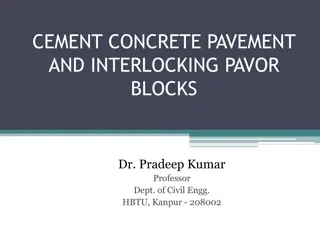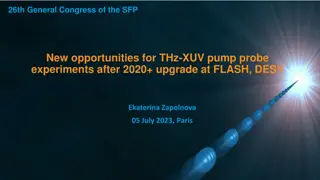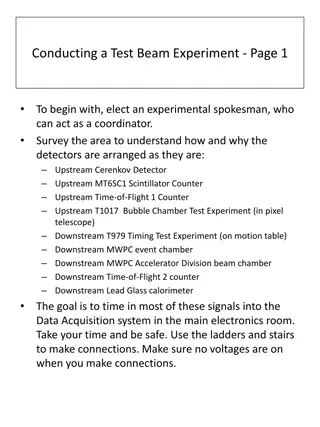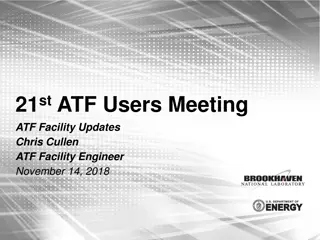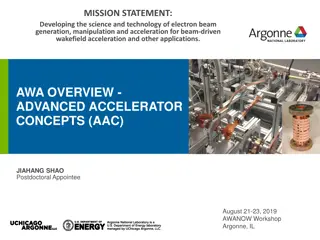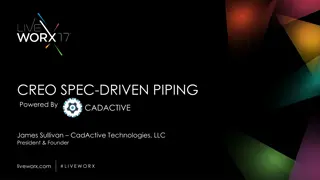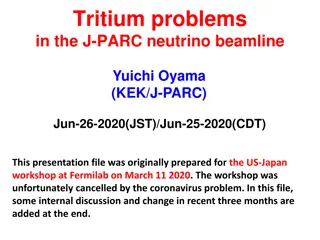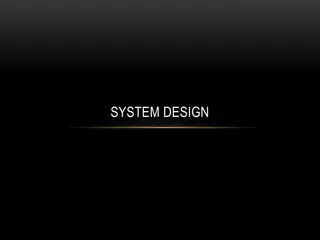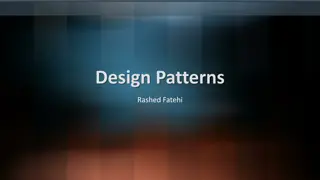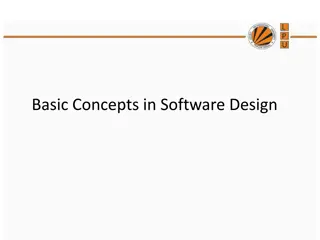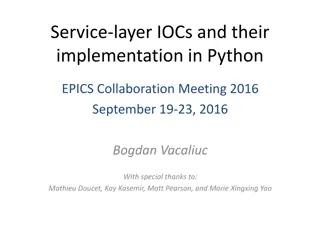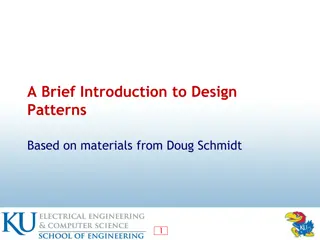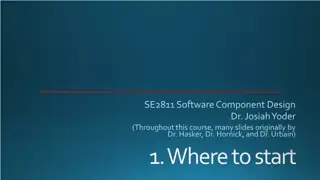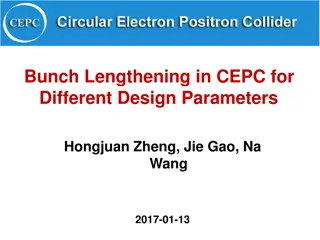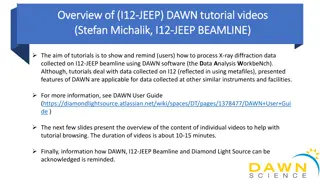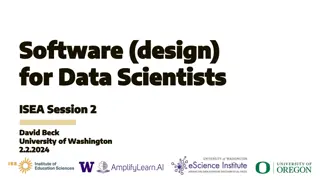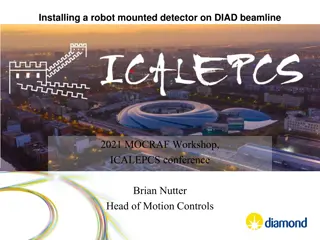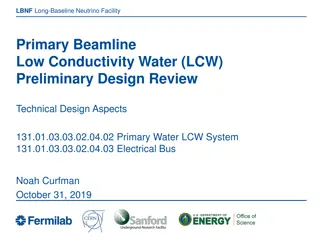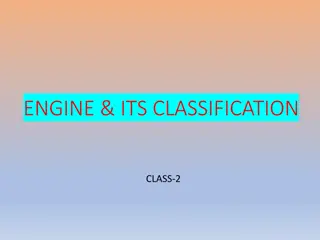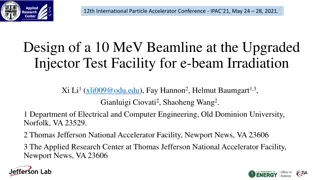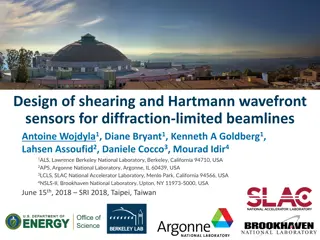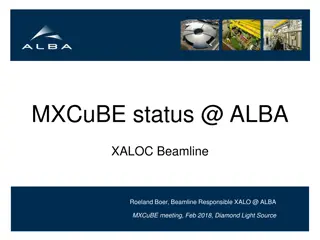GCSE Design Technology Knowledge Organiser and Course Structure Overview
In this detailed knowledge organiser, find information about the GCSE Design Technology course structure, learning objectives, mission statement, and core technical principles for KS4 students. The course emphasizes iterative design cycles, creative thinking, problem-solving, and addressing environm
7 views • 53 slides
Understanding Software Analysis and Design Process
Software analysis and design involve a systematic approach to understanding user requirements, creating logical models, and transitioning to detailed design specifications. Requirements analysis focuses on capturing system requirements, while design translates these requirements into implementation
7 views • 16 slides
Understanding the Process and Types of Research Design
The process of research design involves interactive stages that occur simultaneously, leading to the designing of a research study. This includes steps in research design, classification of research design types, such as exploratory, descriptive, and experimental/causal research design. Each type se
12 views • 8 slides
Exploring Game Design Elements and Character Creation Insights
In this content, we delve into various aspects of game design, character creation, and level design. From discussing a character's appearance, personality, abilities, and backstory to analyzing key elements of level design like gameplay mechanics, flow, and storytelling, this comprehensive guide pro
8 views • 10 slides
APTM and GRID Beamline Elements
Presentation of beamline instrumentation concepts, project planning, and objectives for measuring beam properties at the European Spallation Source. Details include systems overview, beam monitoring instruments, tuning processes, and key parameters such as power, current, and pulse duration.
1 views • 19 slides
Exploring Collimators and Bunkers at ESS for Accelerator Radiation Activation
Dive into the study of collimators for a curved beamline, the design of ESS bunkers, and the innovative NMX instrument for biological macromolecule structure determination at the 4th International Workshop on Accelerator Radiation Induced Activation.
2 views • 40 slides
Textil School for Design, Technology, and Management - Overview
The Textil School for Design, Technology, and Management is a renowned institution funded by the European Union. Offering undergraduate applied studies in Textile and Apparel Design, Textile Engineering, and Management in the Textile Industry, the school focuses on artistic expression, modern method
0 views • 16 slides
Guidelines for Design of Cement Concrete Pavement and Interlocking Paver Blocks
This document provides guidelines for designing cement concrete pavements and interlocking paver blocks, covering factors governing design, wheel loads, design period, subgrade characteristics, approximate k values based on CBR values, and the importance of a sub-base below concrete pavements. It em
0 views • 67 slides
Software Engineering Design Principles and Concepts
The chapter discusses the essential principles and concepts in software design, highlighting the four key design models - data design, architectural design, interface design, and component-level design. It emphasizes the importance of traceability to the analysis model, minimizing the gap between so
0 views • 36 slides
Cutting-Edge Insights from the 26th General Congress of the SFP
Explore the latest advancements in THz-XUV pump probe experiments post the 2020+ upgrade at FLASH, DESY, presented by Ekaterina Zapolnova at the 26th General Congress of the SFP. Discover the intense XUV and THz radiation capabilities at FLASH, applications in structural and electron dynamics of mol
0 views • 13 slides
Conducting a Test Beam Experiment - Step-by-Step Guide
In this step-by-step guide, you will learn how to set up and conduct a test beam experiment. The experiment involves connecting detectors such as Cerenkov Detectors, Scintillator Counters, Bubble Chambers, and more. The process includes handling signal cables, high voltage connections, and checking
1 views • 5 slides
Understanding System on Chip (SoC) Design and Components
Explore the world of System on Chip (SoC) design, components, and working flow. Learn about Intellectual Properties (IP), platform-based design, typical design flows, top-down design approach, and the emerging Electronic System Level (ESL) design flow. Discover the essential components of an SoC, su
0 views • 45 slides
Exploring Design Inspiration and Elements in Costume and Fashion Design
Dive into the world of costume and fashion design through a visual journey of finding design inspiration, understanding the design process, emphasizing originality, and exploring different sources of creativity. Discover how technology, art, food, history, architecture, and nature can spark innovati
0 views • 45 slides
ATF Facility Updates and Enhancements Meeting Summary
Updates and improvements at the ATF Facility as discussed in a meeting include re-polishing of gun cathode, enhanced vacuum systems, reconfiguration of the experimental hall, improvements in beamlines for LWFA and ICS experiments, and new shielding configurations. Beamline enhancements allow for bet
0 views • 16 slides
Advancing Electron Beam Technology for Accelerator Applications
Focusing on electron beam generation, manipulation, and acceleration, this initiative aims to drive advancements in beam-driven wakefield acceleration and related fields. The program at AWA explores high-gradient acceleration for future colliders, collaborating on research and development projects w
0 views • 21 slides
Enhancing Piping Design Efficiency with Spec-Driven Technology
Explore how Spec-Driven Piping technology powered by CADACTIVE offers a standardized approach for piping design in Creo Parametric. This innovative extension streamlines design communication, eliminates errors, and improves design efficiency by utilizing a master catalog, automated checking capabili
0 views • 15 slides
Tritium Problems in J-PARC Neutrino Beamline - Recent Developments and Future Implications
This file discusses the issues related to tritium production in the J-PARC neutrino beamline, particularly focusing on the tritium release from steel walls to cooling water and air. It highlights the concerns regarding potential serious problems in the future and the measures undertaken to address t
0 views • 16 slides
Overview of CRWG Issues and Requests for 10Hz Operation and APS Role
This document discusses CRWG issues related to the 10Hz operation, including the need for 10Hz collision operation, parameter sets for different energy levels, and the addition of a beamline for 10Hz operation. It also covers the APS role in commissioning positron facilities and its usefulness for v
0 views • 14 slides
Material Design: Combining Classic Design Principles with Technological Innovation
Material Design is a design language that combines traditional design principles with the possibilities offered by technology and science. It emphasizes visual language, classic design elements, and innovation to create delightful user experiences. The Material Metaphor, Imagery, Typography, Color,
0 views • 34 slides
Comprehensive Guide to System Design Components and Techniques
System design involves the detailed planning and identification of components in an information system, aiming to provide users with a general understanding of the new system. This process includes techniques like flowcharts, prototyping, and component design, covering aspects such as output design,
0 views • 24 slides
Understanding Design Patterns: A Comprehensive Overview
Exploring the world of design patterns, this content delves into the essence of design patterns, their application in software design to resolve complexity, and the different types of design patterns - creational, structural, and behavioral. It also showcases examples of popular design patterns such
0 views • 22 slides
Designing a Novel Low-Energy Beamline for NA61/SHINE at CERN
Carlo A. Mussolini from the University of Oxford, working at CERN, is designing a new low-energy beamline for NA61/SHINE experiment. The need for a low-energy beamline arises from the lack of particle production data in the 1-13 GeV/c momentum range. Current beam facilities at CERN face challenges w
0 views • 24 slides
Understanding Basic Concepts in Software Design
Software design involves transforming customer requirements into a form suitable for implementation, with activities categorized into preliminary and detailed design stages. High-level design focuses on module identification and control relationships, while detailed design entails defining data stru
1 views • 24 slides
Implementing IOC in Python for Enhanced Automation in EPICS Collaboration Meeting
Beamline instrumentation systems require high automation levels, and EPICS is used as a client/server system with extensive server code support for various hardware types. By implementing a service-layer IOC in Python, the server IOC can focus on hardware operation specifics separately from equipmen
0 views • 14 slides
Muon Campus Operation Report & Performance Summary
This report provides an overview of the Muon Campus operations, including activities conducted, machine downtime, G-2 performance integrated for Run 4, and upcoming plans. Key highlights include beam delivery to G-2, maintenance work, beamline studies, and the status of experiments. The report also
0 views • 5 slides
Exploring 3D Design and Critical Analysis in Architecture
Dive into the world of 3D design and critical analysis with a focus on architecture. Discover the stages of design, essential skills for designers, and areas of study in three-dimensional design. Delve into iconic buildings like Frank Lloyd Wright's Falling Water, analyze their key features, and eve
0 views • 9 slides
Understanding Design Patterns in Object-Oriented Design
Design patterns in object-oriented design (OOD) are essential templates that codify best practices for solving common problems. They help streamline development by capturing proven design decisions, promoting code reuse, and enhancing system flexibility and modularity. Learn about the core concepts,
0 views • 20 slides
Understanding Interaction Design in Human-Computer Interaction
Interaction design focuses on creating interactive products that are easy, effective, and enjoyable to use. It aims to reduce negative user experiences while enhancing positive ones. Designing interactive products requires understanding user activities, interfaces, and device arrangements to support
0 views • 11 slides
SE2811 Software Component Design Overview
This course covers software component design, design patterns, object-oriented design, algorithms, and opportunities for reuse in systems design. It emphasizes the importance of domain-level design and provides insights into solving core problems through reusable classes.
0 views • 21 slides
Analysis of Bunch Lengthening in CEPC for Different Design Parameters
This study explores bunch lengthening in the Circular Electron Positron Collider (CEPC) for various design parameters, analyzing a 54 km design scheme, a 61 km design scheme, and a 100 km design scheme. The analysis includes the theoretical framework used, equations for bunch lengthening, and conclu
1 views • 15 slides
Understanding Plain & Reinforced Concrete Structures in Design Engineering
In the design of Plain & Reinforced Concrete structures, various strength design methods such as Ultimate Strength Design (USD) and Allowable Strength Design (ASD) are utilized. These methods involve factors of safety, material strength, load factors, and analysis in the elastic range. Additionally,
0 views • 11 slides
X-ray Diffraction Data Processing Tutorials with DAWN Software
Learn how to process X-ray diffraction data collected on I12-JEEP beamline using DAWN software through a series of tutorials. Discover features applicable to similar instruments and facilities, presented in 10-15 minute videos covering topics like data viewing, processing, calibration, and peak fitt
0 views • 13 slides
Verilog Adder Examples & Typical IC Design Flow
This comprehensive content delves into Verilog adder examples, typical IC design flow, physical design considerations, and examples of OpenGL ES GPU and ARM hypervisor applications. It covers the fundamentals of digital logic with Verilog design, hardware description language, FPGA prototyping, phys
0 views • 27 slides
Understanding the Importance of Software Design for Data Scientists
Today's ISEA Session 2 with David Beck from the University of Washington delves into the critical role of intentional software design for data scientists. The session covers the software design approach, user-centric design stories, use cases, components, testing strategies, and the benefits and dra
0 views • 76 slides
Installation of Robot-Mounted Detector on DIAD Beamline
Installing a robot-mounted detector on the DIAD beamline for the 2021 MOCRAF Workshop at the ICALEPCS conference. The robot arm holds a diffraction detector for dual imaging and diffraction purposes, ensuring safety for personnel, equipment, and integration into EPICS and GDA systems. Functionality
0 views • 28 slides
Long-Baseline Neutrino Facility (LBNF) Primary Beamline LCW System Overview
The Long-Baseline Neutrino Facility (LBNF) Primary Beamline Low Conductivity Water (LCW) System comprises various technical design aspects including system operational scope, major system updates, design requirements, and component summary. It involves the provision of LCW cooling for magnets and po
0 views • 14 slides
Understanding Engine Classification and Design
Engine classification involves categorizing engines based on various factors such as combustion type, number of strokes, cylinder design, and ignition method. Common classifications include external and internal combustion engines, as well as categories based on the design and use of the engine. Add
0 views • 11 slides
Design of a 10 MeV Beamline for E-beam Irradiation at UITF Wastewater Facility
This paper discusses the design of a 10 MeV beamline at the Upgraded Injector Test Facility for electron beam irradiation, focusing on wastewater treatment for environmental restoration. The use of electron beam irradiation is highlighted as an effective method to remove pollutants like 1,4 dioxane
0 views • 9 slides
Shearing and Hartmann Wavefront Sensors for Diffraction-Limited Beamlines
Design and upgrade of wavefront sensors for diffraction-limited beamlines at various national laboratories, focusing on advanced light sources and soft X-ray applications. The sensors aim to monitor wavefront perturbations and optimize beam quality for enhanced performance. Various sensor designs an
0 views • 22 slides
Progress Update on MXCuBE Integration at ALBA Xaloc Beamline
Update on the integration of MXCuBE 2 at ALBA Xaloc Beamline, highlighting current status, implementation details, and ongoing developments. The project involves the use of SARDANA, TAURUS, and TANGO for beamline control, with a focus on hardware, user interface, and data management. The collaborati
0 views • 13 slides







